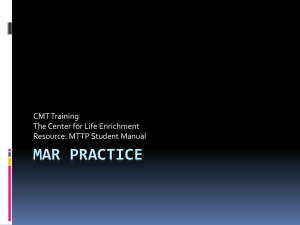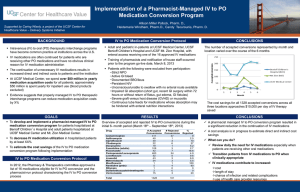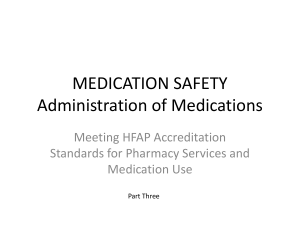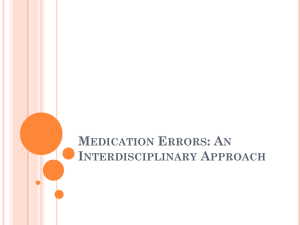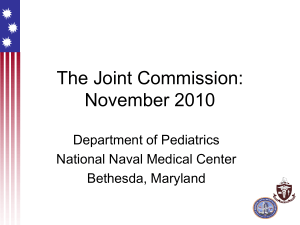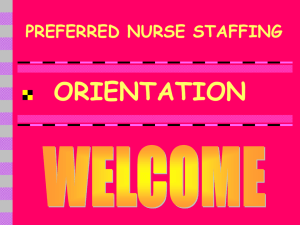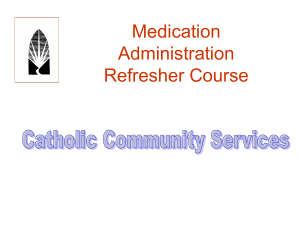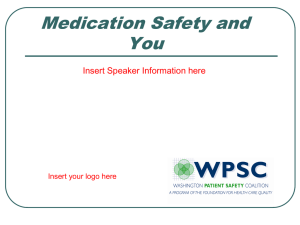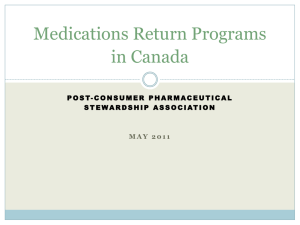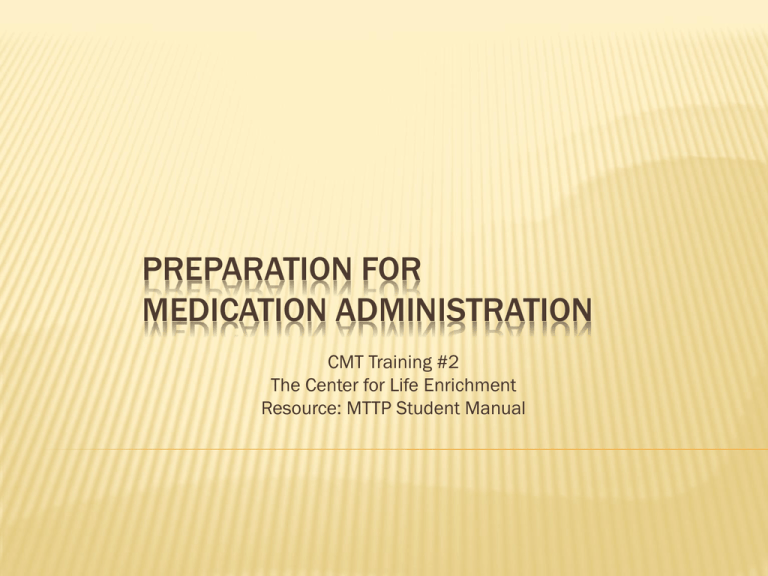
PREPARATION FOR
MEDICATION ADMINISTRATION
CMT Training #2
The Center for Life Enrichment
Resource: MTTP Student Manual
4 BASIC RULES
There are “Four (4) Basic Rules” that must be followed when giving
medication to an individual in a DD community-based agency such as TCLE
1.
Unlicensed Assistant Personnel (UAP) may administer medications
ONLY after the successful completion of the MTTP and certification by
the Maryland Board of Nursing (MBON) as a Medication Technician
(CMT)
2.
Only RN case managers/delegating nurses (RN CM/DN) may delegate
the administration of medications to CMTs who are staff of or under
contract with the DD community based program
3.
All medications must have a current Health Care Provider (HCP) order
and a pharmacy label to be administered
4.
All “over-the-counter” medications must have a current HCP order and
a pharmacy label to be administered
STAFF RESPONSIBILITIES IN ADMINISTERING MEDICATIONS
As a CMT, you will be responsible for ensuring that individuals take their medications
safely
Administering medications safely requires following the Medication Administration
Process/Cycle:
1.
2.
3.
4.
5.
6.
7.
8.
Observing the individual for changes in physical condition and/or changes in
behavior
Reporting these observations to the RN CM/DN and supervisor in an appropriate
time frame
Assisting the individual in a visit to the HCP and communicating and obtaining all
necessary information (May apply to CMTs providing ISS/CSLA support)
Communicating with the pharmacist and obtaining the prescribed medication (i.e.
new orders/refills) (May apply to CMTs providing ISS/CSLA support)
Storing the medication safely
Administering medications correctly
Ensuring medications are taken
Recording information promptly, correctly and on correct forms
MEDICATION ADMINISTRATION RECORD (MAR)
•
•
The MAR is a form used for documenting that medications have been
administered as ordered
Specific information must be recorded on the MAR when a new medication is
received from the pharmacy and when a medication is administered:
– The individual’s name, sex, & birth date
– The name of the agency
– The month and year of the record
– Pertinent diagnoses
– Any allergies the individual may have; “none known” should be written if none
exists
– The individual’s diet as ordered by the HCP (Health Care Professional)
– The individual’s primary physician
– The name of the delegating Registered Nurse responsible for follow-up and
monitoring
ADDING A MEDICATION TO A CURRENT MAR
If there is a current MAR for the individual (meaning that other medications are
already being given this month), and a new medication is ordered, then a new MAR
does not have to be started
The following information about the new medication can be added to the current
MAR:
Name of the medication
Prescribed dose of the medication
Route of the administration
Times (frequency) of administration
Start date is the most recent date on the signed HCP order
The HCP must write a Discontinue Order for all medications/treatments. If applicable,
this discontinued date is to be documented in the D/C column of the MAR
Draw a horizontal line and arrow up to the exact date and time(s) the medication is to
start
REMEMBER,
The MAR is a legal document!
All information must be documented in blue or
black ink
Do not erase!
Do not use whiteout!
“3 WAY CHECK”
Compare the HCP order, the Pharmacy Label, &
MAR
Make sure all 3 match!
MEDICATION STORAGE
•
•
•
•
•
•
All medications must be stored in the original containers in
which they were dispensed by the pharmacist
The pharmacy label should never be altered
All medications must be grouped by the individual and stored
centrally in a locked cabinet (area)
The storage area must be locked when not in use
The key to the locked medicine cabinet (area) or access to a
lock combination should only be available to those
individuals authorized to administer medications
Refrigerated medications must also be kept in a locked
storage container in the refrigerator
DISPOSING OF MEDICATIONS
•
At times you may be responsible for disposing of
medications. This may occur when:
–
–
–
–
–
The medication is discontinued before all of it is used
The individual has refused to take the medication after it has
been poured
The medication is dropped on the floor or becomes
contaminated in some other way
The medication has expired
The RN CM/DN will dispose of any
Schedule II/Controlled Substances according to agency
policy
ANY QUESTIONS?

